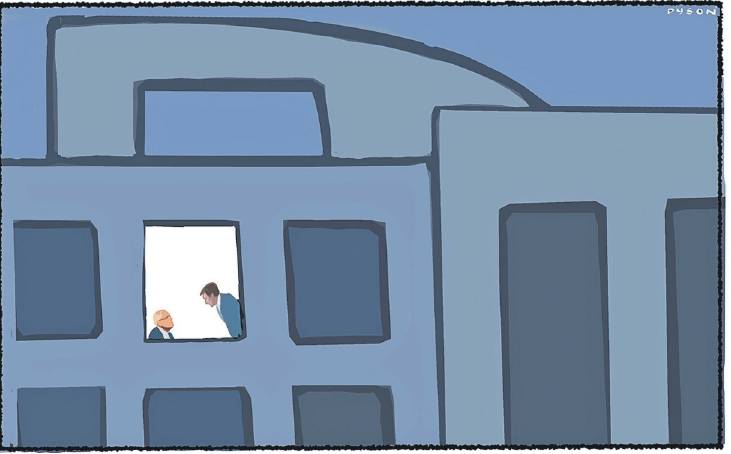PM, if you believe Porter, say so
David Crowe
It is up to the government to convince us Porter is innocent. But Morrison has made no such declaration.
Scott Morrison and Christian Porter were too clever by half when they met on Wednesday last week to talk about claims the Attorney-General raped a young woman three decades ago. The Prime Minister and Attorney-General knew one of their colleagues had a written account from the woman who had claimed the rape, and they knew the document had been sent to police. But they did not read it. They did not try to read it. They did not ask for it.
Very few people have seen the document but it was not hard for Morrison and Porter to find. It had been sent to Liberal backbencher Celia Hammond, who Morrison named last week to review the party’s culture and the treatment of women. Hammond received it on Wednesday, February 24 and forwarded it to the Australian Federal Police. She told Morrison’s office about the claims.
So the government had the allegations before most of the media. Only on Friday, February 26, did ABC journalist Louise Milligan report the claims against an unnamed cabinet minister.
Porter admitted this sequence in his emotional, exhausting but legally careful press conference on Wednesday, one week after that meeting with Morrison: ‘‘I went to his office at his request,’’ Porter said. ‘‘And he said that he had received the material, that I was the subject of it, and that it had gone to the AFP.’’
Then, in the next breath, Porter complained he did not know the allegations. ‘‘I was aware of a rumour,’’ he said. ‘‘But no one has ever put the specifics of an allegation to me from the media.’’
From the media. That is very careful. We know now that Porter did not have to wait for the media. He could have asked for the allegations last week.
Porter did not have to see the document to deny the rape, of course. His denial is emphatic and complete: ‘‘It just did not happen.’’
It is wrong for his accusers to gloss over his denial as if it means nothing. There is a case for cynicism in politics, but it should take more than cynicism to convict a politician in the dubious court of public opinion. However, it was Porter who complained that he had not seen the allegations.
Only now do we know why NSW Police did not interview Porter and put the claim to him after the woman came forward in February last year. She never signed a formal statement and withdrew the claim on June 23. ‘‘The woman very clearly articulated in that email that she did not want to proceed with the complaint,’’ police said. She took her life in Adelaide on June 24.
This did not stop Porter from reading the allegations and responding when he had the chance
– in that meeting with Morrison about the worst ever accusation against a federal minister. (Thomas Ley, politician and murderer, never made it to the frontbench.)
Nobody can be faulted for referring a claim to the AFP. No doubt it was a safe political move to avoid reading the document. But it could be dangerous to Porter’s credibility. Australians are being asked to make a judgment on whether they trust him when he tells them he is innocent. So they might have a commonsense question: ‘‘Wouldn’t you want to read the allegations against you?’’
Remember, the same letter and document went directly to the PM’s office two days later, on the Friday. Again, Morrison did not read it. He did not arrange for Porter to read it. Everything comes down to trust. One of the woman’s friends, Dhanya Mani, wants an inquiry to pursue what the police did not. The problem with that call is that an inquiry would break with federal precedent. Bill Shorten was able to draw a line under a rape allegation when Victoria Police closed their investigation in 2014. Most of the media dropped the matter.
One difference is that Shorten was interviewed by police in response to a formal statement. This did not happen with Porter. Is the contrast enough to justify an inquiry? Or is it an excuse for politicians and journalists to throw Porter in the dock when they did not do the same to Shorten?
The next step is the South Australian coroner’s decision. The woman’s family wants an inquiry into what led to her death, so the grounds for an inquest are strong. But those who want a wider inquiry into the claim of rape in 1988 will have to make a stronger case. Do they merely want a lower burden of proof so they can convict on an unsworn statement?
This is about whether Porter is a fit and proper person to hold his job. So the forum that counts most is the Parliament. That is where the government must defend its minister and convince Australians he is innocent. Morrison makes no such declaration. Asked yesterday whether he believed Porter, he dodged: ‘‘My judgment is based on the report of the police.’’ He didn’t say what that judgment was.
Australians saw the same evasion when Morrison was asked on Monday whether he believed his cabinet minister. ‘‘That is a matter for police,’’ he said.
If Morrison believes Porter, he should say so. If he does not, he should ask him to resign. You might call that common sense.
David Crowe is chief political correspondent.

